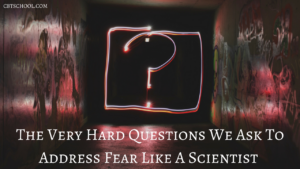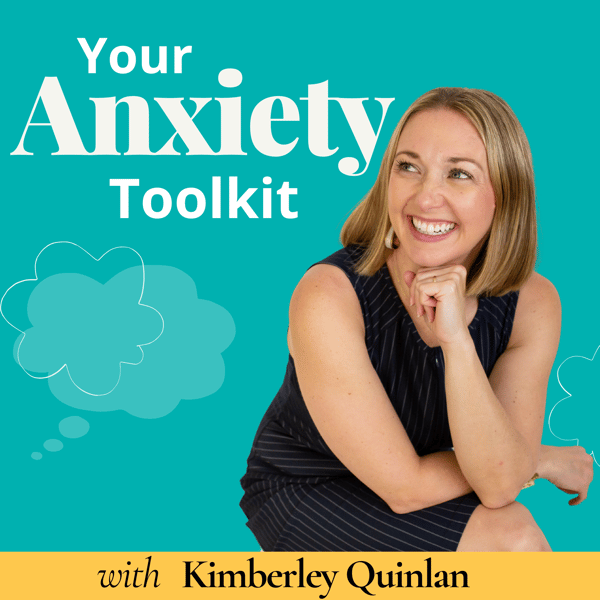Ep. 63: Addressing Fear Like A Scientist
Your Anxiety Toolkit - Anxiety & OCD Strategies for Everyday
Kimberley Quinlan, LMFT | Anxiety & OCD Specialist
4.9 • 802 Ratings
🗓️ 25 August 2018
⏱️ 18 minutes
🧾️ Download transcript
Summary
 In this episode of Your Anxiety Toolkit, we talk about Addressing Fear like Scientists. Not the scary white haired kind! In this week's episode, we talk about becoming scientists who run studies that are rational, evidence-based, and experienced-based. Each time we have a thought, we have an opportunity to be a scientist. Don’t worry about those white coats. You don’t need them for these experiments. And you don’t need to have a fully fledged scientist degree either.
In this episode of Your Anxiety Toolkit, we talk about Addressing Fear like Scientists. Not the scary white haired kind! In this week's episode, we talk about becoming scientists who run studies that are rational, evidence-based, and experienced-based. Each time we have a thought, we have an opportunity to be a scientist. Don’t worry about those white coats. You don’t need them for these experiments. And you don’t need to have a fully fledged scientist degree either.
The human brain has up to 70,000 thoughts per day. That is a LOT of thoughts. When it comes to managing anxiety, much of the work is being able to identify which thoughts that are distorted (or errors) and which are not, so we can respond skillfully and mindfully. This is not an easy feat and takes ongoing work and courage.
The other day, I started thinking about all the lovely people who are being tormented by scary intrusive thoughts, unwanted emotions, and sensations that make them think and feel like there is something wrong with them. Sometimes these intrusive thoughts make us believe that something bad will happen, or that terror is on its way. Often when we have these unwanted, intrusive thoughts, we go into a pattern of trying to disprove these possibilities. We start to shift our day, just to prove that this is in no way possible. We try to make the uncertain, certain.
The problem with this is that we are not actually resolving the issues in REALITY. What we do when we have these obsessions is we create a new reality where the fear is less likely to occur. We do this by avoiding events or people or places. We also try to ensure that our fear won't come true by mentally reviewing all of the possible scenarios and how they might play out. Once we have mentally exhausted ourselves with identifying what specific scenarios might cause troublesome outcomes, we promise ourselves to never put ourselves in those situations.
How To Address Fear Like A Scientist
Addressing Fear like a scientist involves asking yourself a few very hard questions. Take a look at these questions and do a quick review on how you are responding to your anxiety and depression.
- What hypothesis (theory) is my depression, anxiety, obsessive compulsive disorder (OCD) trying to prove?
- Is this hypothesis true and based in reality and reason?
- Can I test the evidence in a non-biased way?
- Can I look at it from every angle without running away from fear? Or trying to solve it? Or steer the outcomes?
- Can I sit with the results of the experiment?
- Am I spending my time trying to prove my hypothesis or am I open to actually doing the work of a scientist, who is unbiased and accepting of the outcomes?
I invite you this week to be more vigilant about addressing fear like a scientist who tests the hypothesis in a non-biased, rational and reality-based way. I know this is hard, but you know what I am going to say here. It is a beautiful day to do hard things.
Also, CBT School is also excited to share that our lovely friend Stuart Ralph is offering The OCD Summit, an online summit specifically for OCD therapists. The OCD Summit will be a 6-week webinar series where Stuart Ralph, host of The OCD Stories podcast, will interview some incredible scientists and clinicians in the OCD field, with you the therapist as the audience. Kimberley is honored to be selected to be one of the panelists for this exciting event. Registration will include 6 topics curated for your continued development as an OCD therapist, where you can ask questions and network with other therapists in the private FB group community. Click here to join.
Transcript
Click on a timestamp to play from that location
| 0:00.0 | This is Your Anxiety Toolkit, episode number 63. |
| 0:10.0 | Welcome to Your Anxiety Toolkit. I'm your host, Kimberly Quinlan. This podcast is fueled by three |
| 0:17.0 | main goals. The first goal is to provide you with some extra tools to help you manage your |
| 0:22.2 | anxiety. Second goal, to inspire you. Anxiety doesn't get to decide how you live your life. And number |
| 0:29.7 | three, and I leave the best for last, is to provide you with one big, fat virtual hug, because |
| 0:36.8 | experiencing anxiety ain't easy. |
| 0:39.2 | If that sounds good to you, let's go. |
| 0:46.2 | Well, welcome back CBT school community. |
| 0:49.7 | I am so thrilled to have you. |
| 0:51.3 | My name is Kimberly Quinlan. |
| 0:53.6 | And today on your anxiety toolkit, we are going to |
| 0:57.3 | talk about being a scientist. Now, for any of you who know me, I just get totally geeked out about |
| 1:05.1 | science. And it's funny because I really wasn't a kid who liked science at school, but since I have |
| 1:11.7 | delved into the area of mental health and psychology, the scientific component of that just |
| 1:20.5 | fascinates me. And I've actually really been enjoying lately, noticing how much my six-year-old daughter loves, loves, |
| 1:29.2 | loves, loves science. And I've started to think of it from a different perspective, |
| 1:34.4 | particularly related to how we manage anxiety, right? Now, what we know is when it comes to science, |
| 1:44.0 | is we first have a hypothesis, right? |
| 1:48.7 | This idea, this thing that we want to prove. |
| 1:51.8 | Now, and when we think about this idea of wanting to prove something, that kind of sounds like |
| 1:58.8 | what it's like when we have anxiety. |
| 2:02.9 | Am I right? Like that's what got me thinking here is like, wow, being a scientist is a lot like being someone who has anxiety, right? |
... |
Please login to see the full transcript.
Disclaimer: The podcast and artwork embedded on this page are from Kimberley Quinlan, LMFT | Anxiety & OCD Specialist, and are the property of its owner and not affiliated with or endorsed by Tapesearch.
Generated transcripts are the property of Kimberley Quinlan, LMFT | Anxiety & OCD Specialist and are distributed freely under the Fair Use doctrine. Transcripts generated by Tapesearch are not guaranteed to be accurate.
Copyright © Tapesearch 2025.

